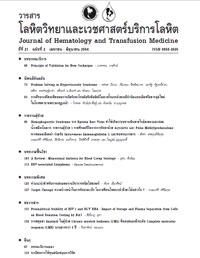การตรวจหาแอนติบอดีของหมู่เลือดชนิด IgG ของมารดาเพื่อการให้เลือดที่ปลอดภัยในทารกแรกเกิด ณ โรงพยาบาลศิริราช
Keywords:
HDFN, IgG maternal antibodies, Elution testAbstract
บทคัดย่อ
Hemolytic disease of the fetus and newborn (HDFN) เป็นโรคที่เกิดในทารกตั้งแต่อยู่ในครรภ์จนถึงแรกเกิด เนื่องจากเม็ดเลือดแดงของทารกถูกทำลายโดยแอนติบอดีของหมู่เลือด ชนิด IgG จากมารดา ซึ่งเกิดขึ้นภายหลังการได้รับเลือดหรือเคยตั้งครรภ์มาก่อน ความรุนแรงของโรคแตกต่างกันขึ้นกับชนิดและความแรงของแอนติบอดีจากมารดาและชนิดของแอนติเจนบนเม็ดเลือดแดงทารก การตรวจทางซีโรโลยีช่วยในการวินิจฉัยและการทำนายความรุนแรงของโรคซึ่งเป็นสิ่งสำคัญต่อการรักษาและการป้องกัน รวมทั้งการเตรียมเลือดที่เหมาะสมเพื่อเปลี่ยนถ่ายเลือดให้แก่ทารก ในการศึกษานี้ได้ทำการตรวจเลือดทารกแรกเกิดจนถึงอายุ 7 วันที่มีอาการเหลือง จำนวน 346 ราย โดยทำการตรวจ ABO grouping, Rh (D) typing, direct antiglobulin test (DAT), indirect antiglobulin test (IAT), และทำelution test 2 วิธี คือ Lui freeze – thaw และ acid elution test สำหรับตรวจหา IgG anti –A หรือ anti –B และแอนติบอดีชนิดอื่นจากมารดา ตามลำดับ จากการศึกษาพบ ABO HDFN ร้อยละ 63.9 ซึ่งการตรวจ DAT, IAT และ elution test ให้ผลบวกร้อยละ 30.8, 63.3 และ 85.1 ตามลำดับและพบว่ารายที่ DAT ให้ผลบวก การทำelution test ให้ผลบวกด้วยทุกราย แต่รายที่ DAT ให้ผลลบ พบว่า elution test ให้ผลบวกร้อยละ 78.4 ในทารกที่ IAT ให้ผลบวก พบว่ามีร้อยละ 95.8 ที่ elution test ให้ผลบวกเช่นกัน แต่ในรายที่ IAT ให้ผลลบ พบว่ามีร้อยละ 61.7 ที่ elution test ให้ผลบวก นอกจากนี้ ยังพบแอนติบอดีในเลือดมารดา 3 ราย คือ anti – E, anti – E+Mia และ anti - Jka ทุกรายไม่ได้ทำการเปลี่ยนถ่ายเลือด แม้ว่า 2 ใน 3 รายมี DAT บวกและใน eluate ทุกรายตรวจพบแอนติบอดีชนิดเดียวกับแอนติบอดีในมารดา ในการศึกษาครั้งนี้ไม่พบมารดา Rh ลบ สรุป : ในการตรวจเลือดทารกที่มีภาวะเหลืองเพื่อวินิจฉัยโรค HDFN และจัดเตรียมเลือดให้นั้น นอกจากตรวจหาหมู่เลือด ABO, Rh (D), DAT และ IAT แล้ว ควรทำ elution test ร่วมด้วยทุกราย เพื่อบอกชนิดของแอนติบอดีที่เป็นสาเหตุ ซึ่งจะเป็นประโยชน์ต่อการวินิจฉัย การรักษาโดยเฉพาะอย่างยิ่ง การเตรียมเลือดเพื่อเปลี่ยนถ่ายเลือดให้ทารก และการให้การป้องกันสำหรับการตั้งครรภ์ครั้งต่อไปหากมารดาเป็น Rh ลบ
Key Words : HDFN ; IgG maternal antibodies ; Elution test
Abstract
Hemolytic disease of the fetus and newborn (HDFN) is a disease of the fetus and newborn caused by IgG maternal antibodies resulting from previous transfusions or pregnancies. These antibodies directed against fetal red cells, can cross the placenta and cause red cell destruction. The disease has a wide range of severity due to the level of maternal antibodies and the characteristics of antigens with respect to fetal red cells. The serologic tests play an important role in diagnosis, predicting the severity, giving appropriate treatment, and prevention of the disease.
In this study, blood samples from 346 newborns with hyperbilirubinemia were tested for ABO, Rh (D), direct antiglobulin test (DAT) and indirect antiglobulin test (IAT). Lui freeze-thaw and acid elution tests were used for the detection of IgG ABO antibodies and maternal alloantibodies attached to newborn red cells, respectively. The positive results of DAT, IAT and elution test in ABO HDFN, which found in 63.9% of the cases were 30.8%, 63.3%, and 85.1%, respectively. It was found that Lui freeze- thaw elution test gave positive results in all positive DAT and in 78.4% of negative DAT cases. The test also gave positive results in 95.8% and 61.7% of positive and negative IAT cases, respectively. In addition, maternal clinically significant alloantibodies (anti-E, anti-E+Mia and anti-Jka) were found in 3 cases in which the same antibodies were found in the eluates, but none required exchange transfusion. Rh negative case was not found in this study.
In conclusion, elution tests should be included as routine tests performed in the investigation of HDFN. The causative antibodies could be demonstrated, as a result, definite diagnosis, appropriate management, especially selection of blood for exchange transfusion, and prevention for future pregnancies could be achieved.
Key Words : HDFN ; IgG maternal antibodies ; Elution test



